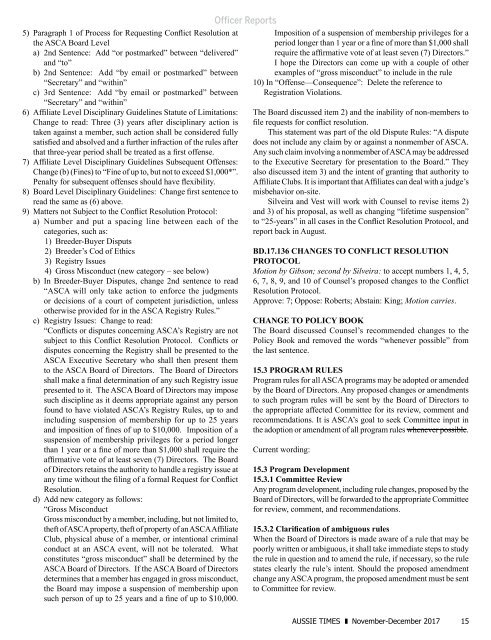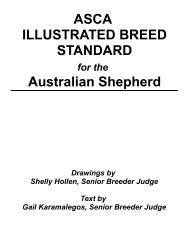You also want an ePaper? Increase the reach of your titles
YUMPU automatically turns print PDFs into web optimized ePapers that Google loves.
5) Paragraph 1 of Process for Requesting Conflict Resolution at<br />
the ASCA Board Level<br />
a) 2nd Sentence: Add “or postmarked” between “delivered”<br />
and “to”<br />
b) 2nd Sentence: Add “by email or postmarked” between<br />
“Secretary” and “within”<br />
c) 3rd Sentence: Add “by email or postmarked” between<br />
“Secretary” and “within”<br />
6) Affiliate Level Disciplinary Guidelines Statute of Limitations:<br />
Change to read: Three (3) years after disciplinary action is<br />
taken against a member, such action shall be considered fully<br />
satisfied and absolved and a further infraction of the rules after<br />
that three-year period shall be treated as a first offense.<br />
7) Affiliate Level Disciplinary Guidelines Subsequent Offenses:<br />
Change (b) (Fines) to “Fine of up to, but not to exceed $1,000*”.<br />
Penalty for subsequent offenses should have flexibility.<br />
8) Board Level Disciplinary Guidelines: Change first sentence to<br />
read the same as (6) above.<br />
9) Matters not Subject to the Conflict Resolution Protocol:<br />
a) Number and put a spacing line between each of the<br />
categories, such as:<br />
1) Breeder-Buyer Disputs<br />
2) Breeder’s Cod of Ethics<br />
3) Registry Issues<br />
4) Gross Misconduct (new category – see below)<br />
b) In Breeder-Buyer Disputes, change 2nd sentence to read<br />
“ASCA will only take action to enforce the judgments<br />
or decisions of a court of competent jurisdiction, unless<br />
otherwise provided for in the ASCA Registry Rules.”<br />
c) Registry Issues: Change to read:<br />
“Conflicts or disputes concerning ASCA’s Registry are not<br />
subject to this Conflict Resolution Protocol. Conflicts or<br />
disputes concerning the Registry shall be presented to the<br />
ASCA Executive Secretary who shall then present them<br />
to the ASCA Board of Directors. The Board of Directors<br />
shall make a final determination of any such Registry issue<br />
presented to it. The ASCA Board of Directors may impose<br />
such discipline as it deems appropriate against any person<br />
found to have violated ASCA’s Registry Rules, up to and<br />
including suspension of membership for up to 25 years<br />
and imposition of fines of up to $10,000. Imposition of a<br />
suspension of membership privileges for a period longer<br />
than 1 year or a fine of more than $1,000 shall require the<br />
affirmative vote of at least seven (7) Directors. The Board<br />
of Directors retains the authority to handle a registry issue at<br />
any time without the filing of a formal Request for Conflict<br />
Resolution.<br />
d) Add new category as follows:<br />
“Gross Misconduct<br />
Gross misconduct by a member, including, but not limited to,<br />
theft of ASCA property, theft of property of an ASCA Affiliate<br />
Club, physical abuse of a member, or intentional criminal<br />
conduct at an ASCA event, will not be tolerated. What<br />
constitutes “gross misconduct” shall be determined by the<br />
ASCA Board of Directors. If the ASCA Board of Directors<br />
determines that a member has engaged in gross misconduct,<br />
the Board may impose a suspension of membership upon<br />
such person of up to 25 years and a fine of up to $10,000.<br />
Officer Reports<br />
Imposition of a suspension of membership privileges for a<br />
period longer than 1 year or a fine of more than $1,000 shall<br />
require the affirmative vote of at least seven (7) Directors.”<br />
I hope the Directors can come up with a couple of other<br />
examples of “gross misconduct” to include in the rule<br />
10) In “Offense—Consequence”: Delete the reference to<br />
Registration Violations.<br />
The Board discussed item 2) and the inability of non-members to<br />
file requests for conflict resolution.<br />
This statement was part of the old Dispute Rules: “A dispute<br />
does not include any claim by or against a nonmember of ASCA.<br />
Any such claim involving a nonmember of ASCA may be addressed<br />
to the Executive Secretary for presentation to the Board.” They<br />
also discussed item 3) and the intent of granting that authority to<br />
Affiliate Clubs. It is important that Affiliates can deal with a judge’s<br />
misbehavior on-site.<br />
Silveira and Vest will work with Counsel to revise items 2)<br />
and 3) of his proposal, as well as changing “lifetime suspension”<br />
to “25-years” in all cases in the Conflict Resolution Protocol, and<br />
report back in August.<br />
BD.17.136 CHANGES TO CONFLICT RESOLUTION<br />
PROTOCOL<br />
Motion by Gibson; second by Silveira: to accept numbers 1, 4, 5,<br />
6, 7, 8, 9, and 10 of Counsel’s proposed changes to the Conflict<br />
Resolution Protocol.<br />
Approve: 7; Oppose: Roberts; Abstain: King; Motion carries.<br />
CHANGE TO POLICY BOOK<br />
The Board discussed Counsel’s recommended changes to the<br />
Policy Book and removed the words “whenever possible” from<br />
the last sentence.<br />
15.3 PROGRAM RULES<br />
Program rules for all ASCA programs may be adopted or amended<br />
by the Board of Directors. Any proposed changes or amendments<br />
to such program rules will be sent by the Board of Directors to<br />
the appropriate affected Committee for its review, comment and<br />
recommendations. It is ASCA’s goal to seek Committee input in<br />
the adoption or amendment of all program rules whenever possible.<br />
Current wording:<br />
15.3 Program Development<br />
15.3.1 Committee Review<br />
Any program development, including rule changes, proposed by the<br />
Board of Directors, will be forwarded to the appropriate Committee<br />
for review, comment, and recommendations.<br />
15.3.2 Clarification of ambiguous rules<br />
When the Board of Directors is made aware of a rule that may be<br />
poorly written or ambiguous, it shall take immediate steps to study<br />
the rule in question and to amend the rule, if necessary, so the rule<br />
states clearly the rule’s intent. Should the proposed amendment<br />
change any ASCA program, the proposed amendment must be sent<br />
to Committee for review.<br />
AUSSIE TIMES <strong>Nov</strong>ember-<strong>Dec</strong>ember <strong>2017</strong> 15



